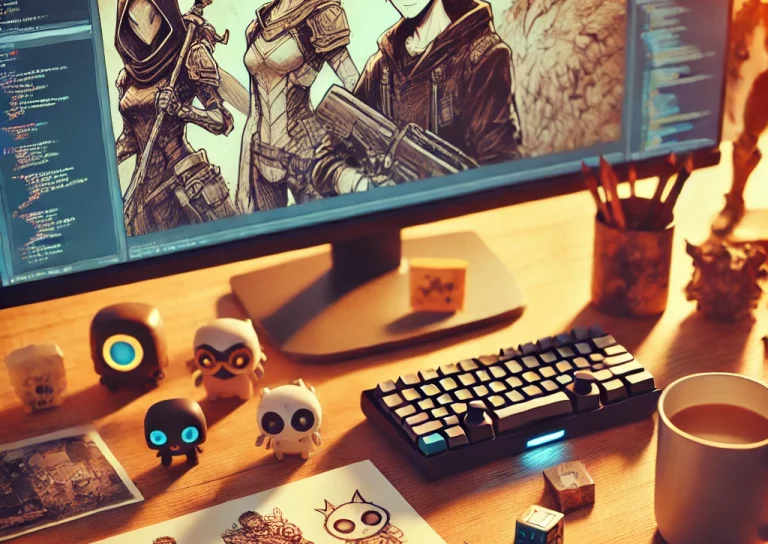What Does “Best” Mean in Video Games?
This morning, I read The Economist’s article on the best video games of 2024. It was a timely reminder of just how subjective such lists have to be to remain both concise and engaging—a truth that’s easy to forget. But it also reignited a question I’ve pondered over the years: what does “best” really mean when it comes to games?
Having spent two decades in game development, I’ve seen firsthand how layered this question can be. Is “best” about the players’ experience, the developers’ journey, or a game’s broader impact on the industry? Perhaps it’s a mix of all three.
In a field as multifaceted as ours, greatness isn’t just about the end product. It’s about how a game resonates with players, how it was brought to life, and what it contributes to the medium as a whole. While the untold stories behind this year’s standout games remain shrouded in secrecy—understandably so in such a competitive industry—it’s worth taking a moment to explore the broader meaning of excellence, especially in a year marked by profound change.
The “Best” for Players
From a player’s perspective, the “best” game can take many forms. It could be the one with the most gripping story, a technical showpiece that pushes hardware to its limits, or a social hub where friendships are forged. For others, it’s about inclusivity—games that lower barriers, inviting more people to join in and feel truly welcome.
But preferences are deeply personal. A sprawling RPG that immerses one player might overwhelm another. A lightning-fast shooter could exhilarate some while leaving others cold. This diversity of tastes is one of gaming’s greatest strengths—it ensures there’s something for everyone.
What makes gaming so extraordinary is its capacity to deliver profoundly different experiences. The “best” game for one person won’t resonate with everyone, and that’s not just acceptable—it’s wonderful. The richness of this medium lies in its variety.
The “Best” for Developers
Behind every great game is a team of developers who brought it to life—a feat that’s rarely straightforward. Game development is a demanding craft, blending creativity, technical skill, and intense collaboration, often under significant time constraints.
For developers, excellence isn’t just about whether the final product is exceptional. It’s also about how it was made. Were the team’s efforts sustainable? Did creativity flourish without sacrificing well-being? Were developers supported and respected throughout the process?
A game might rake in awards and captivate millions, but if its creation left behind burnout, fractured teams, or toxic working conditions, can it truly be called the “best”? For a game to represent excellence, it must also reflect the well-being of those who built it.
The “Best” for the Industry
This year has been transformative for the industry. The rise of AI tools in development, ongoing discussions around workplace fairness, and an increased focus on representation have all shaped the landscape. In this context, the “best” games might reflect progress—whether that’s through pioneering diverse storytelling, embracing sustainable production methods, or breaking new creative ground.
Games don’t exist in isolation. They inspire players, challenge creators, and contribute to the evolution of the medium. The “best” game might not only succeed on its own terms but also leave a lasting impact, influencing how games are made and experienced for years to come.
Redefining “Best”
The idea of a single “best” game is as elusive as it is subjective. Games are intricate, multi-faceted creations; their meaning depends on who we are, what we value, and how we play. Rather than chasing a definitive “best,” perhaps it’s more meaningful to celebrate the breadth of what games can achieve—technical mastery, emotional depth, inclusivity, and more.
As we reflect on 2024’s standout games, we have a chance to rethink what excellence really means. How do we honour not only the games themselves but also the processes behind their creation? Great games don’t appear out of thin air; they emerge from talented teams navigating a complex and ever-changing industry to bring their visions to life.
As we celebrate this year’s achievements, it’s worth asking: how do we balance the pursuit of exceptional games with the need for sustainable, inclusive, and ethical development practices?
Further Reading
If these themes resonate with you, here are a few thought-provoking articles to explore:
- What Makes a Game of the Year? – Polygon
- South Korea Starts to Raise the Game on Workplace Mental Health – Financial Times
- Civilization 7 Makers Work with Shawnee to Bring Sincere Representation to the Game – Associated Press

